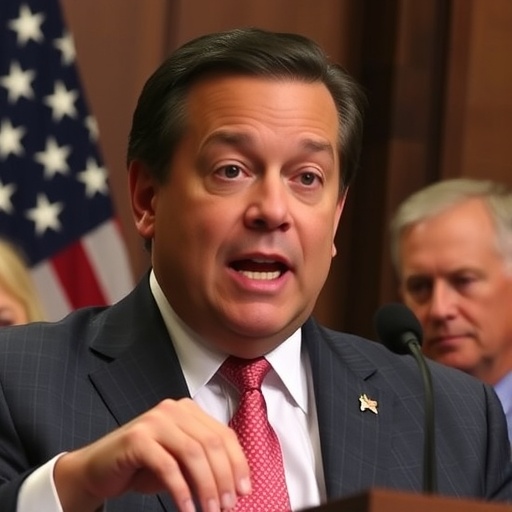Mike Johnson Battles Surging Republican Revolt as Budget Deadline Fuels Shutdown Fears in Congress
In a high-stakes showdown on Capitol Hill, House Speaker Mike Johnson is staring down a fierce rebellion from within his own party, as conservative House Republicans vow to torpedo ongoing budget negotiations just weeks before a critical November deadline. The escalating internal GOP rift, pitting fiscal hawks against moderates, has ignited widespread alarm over the prospect of another government shutdown, potentially paralyzing federal operations and derailing key legislative priorities.
- Conservative Firebrands Rally Against Johnson’s Compromise Plan
- Johnson’s High-Wire Act: Navigating GOP Fractures and Democratic Demands
- Shadows of Past Shutdowns: Lessons from GOP Infighting
- Broader Ripples: How Budget Chaos Threatens National Priorities
- Path Forward: Deadline Looms as Johnson Seeks Bipartisan Lifeline
The tension erupted publicly this week when a group of hardline conservatives, led by influential figures like Rep. Chip Roy of Texas, publicly lambasted Johnson’s latest spending framework as insufficiently aggressive on cutting federal expenditures. With the current stopgap funding measure set to expire on November 17, 2023, the impasse threatens to halt everything from national park operations to military paychecks, echoing the chaos of previous shutdowns in 2018 and 2019 that cost the economy billions.
Sources close to the negotiations reveal that at least 20 House Republicans are signaling they won’t support any bill that doesn’t include steeper reductions in non-defense discretionary spending. This defiance comes amid broader frustrations over Johnson’s leadership style, with critics accusing him of compromising too readily with Democrats to avoid procedural gridlock. As one anonymous GOP aide put it, “The Speaker’s walking a tightrope, but the conservatives are ready to cut the line.”
Conservative Firebrands Rally Against Johnson’s Compromise Plan
The core of the rebellion traces back to the House Freedom Caucus, a bloc of ultra-conservative lawmakers who have long championed draconian budget cuts as a bulwark against what they call Washington’s “out-of-control spending.” In a fiery floor speech on Wednesday, Rep. Roy declared, “We’re not going to rubber-stamp another bloated budget that balloons the national debt. Speaker Johnson needs to listen to the base or face the consequences.”
This isn’t mere posturing; the group’s leverage is real. House Republicans hold a razor-thin majority of just five seats, meaning even a handful of defections could sink any spending bill. Historical data from the Congressional Budget Office underscores the stakes: the last government shutdown in late 2018-early 2019 lasted 35 days, furloughing 800,000 federal workers and inflicting an estimated $11 billion hit to the U.S. economy.
Johnson’s proposed budget outline, which aims to cap fiscal year 2024 spending at around $1.59 trillion for non-defense programs—a slight reduction from current levels—has been dismissed by rebels as “window dressing.” They demand at least 10% across-the-board cuts, targeting areas like environmental protection and foreign aid. To bolster their case, conservatives point to recent inflation spikes, with the Consumer Price Index rising 3.7% year-over-year in September 2023, arguing that unchecked federal outlays are fueling economic woes.
Interviews with multiple Freedom Caucus members reveal a deeper grievance: Johnson’s perceived coziness with Senate Majority Leader Chuck Schumer and President Biden’s administration. “We’ve given the Speaker every chance, but he’s prioritizing party unity over principle,” said Rep. Matt Gaetz, a vocal Johnson critic who played a pivotal role in ousting former Speaker Kevin McCarthy last year. This sentiment is echoed in private GOP whip counts, where opposition to the current plan hovers at 25 votes—more than enough to force a rethink.
Johnson’s High-Wire Act: Navigating GOP Fractures and Democratic Demands
For Mike Johnson, elected Speaker in October 2023 after a protracted internal battle, this crisis tests the limits of his consensus-building approach. A devout conservative from Louisiana with a background in constitutional law, Johnson has positioned himself as a bridge-builder, but the budget fight exposes the fragility of his coalition. In a recent closed-door meeting, he urged unity, stating, “We must avoid the pitfalls of division that have plagued us before. A shutdown helps no one—least of all the American people.”
Yet, Johnson’s challenges extend beyond his right flank. Democrats, holding the Senate and White House, are pushing for restored funding levels to previous years, including boosts for social programs and infrastructure. Senate Appropriations Committee Chair Patty Murray warned this week, “House Republicans’ extremism risks real harm to families relying on vital services. We’re prepared to negotiate in good faith, but not at the expense of progress.”
The Speaker’s strategy involves threading the needle: securing enough conservative buy-in through targeted concessions, like enhanced border security funding, while placating moderates from swing districts wary of shutdown fallout. Polling from Quinnipiac University shows that 62% of voters blame congressional Republicans for potential disruptions, a statistic Johnson can’t ignore as midterms loom.
Behind the scenes, Johnson’s team is leveraging procedural tools, such as the Holman Rule, which allows targeted spending cuts within appropriations bills. But with time ticking—Congress must pass 12 individual spending bills or a continuing resolution by mid-November—the window for maneuvering is narrowing. GOP leadership has already delayed a planned vote on the continuing resolution, buying a few days but heightening anxiety among staffers bracing for all-nighters.
Shadows of Past Shutdowns: Lessons from GOP Infighting
The current drama isn’t unfolding in a vacuum; it’s a redux of recurring congressional dysfunction that has defined recent budget cycles. Recall the 2023 debt ceiling saga, where Johnson himself helped broker a bipartisan deal averting default, only to face backlash from the same conservatives now rebelling. That agreement, which suspended the debt limit until January 2025, included modest spending caps but fell short of the deep reforms demanded by fiscal purists.
Further back, the 2018 shutdown over border wall funding saw then-President Trump siding with hardliners, resulting in the longest closure in history. Economists at the Federal Reserve estimated it shaved 0.1% off GDP growth in Q1 2019, with ripple effects lingering for months. Today’s stakes feel eerily similar, amplified by post-pandemic recovery challenges and geopolitical tensions, including aid to Ukraine and Israel that conservatives want to scrutinize.
Key statistics highlight the human cost: During the 2018-2019 shutdown, over 10 million Americans lost access to Head Start programs, and IRS refund processing delays affected millions of taxpayers. House Republicans, sensitive to these optics, are split on strategy—some moderates like Rep. Brian Fitzpatrick of Pennsylvania advocate for a “clean” continuing resolution to kick the can down the road, while others insist on immediate reforms.
Expert analysis from the Bipartisan Policy Center warns that a shutdown now could exacerbate inflation by disrupting supply chains and consumer confidence. “Congress has the tools to avoid this, but political will is the missing ingredient,” said center director Jason Grumet in a recent op-ed. For Johnson, the lesson from history is clear: Unity isn’t optional; it’s survival.
Broader Ripples: How Budget Chaos Threatens National Priorities
Beyond the Hill’s marble halls, the brewing budget battle casts a long shadow over national priorities. Defense hawks within the GOP are particularly incensed, as any shutdown would delay $886 billion in military funding, potentially stalling weapons procurement amid rising threats from China and Russia. The Pentagon has already warned of readiness issues if funding lapses.
On the domestic front, programs like SNAP (food stamps) and WIC (women, infants, and children nutrition) face interruption, disproportionately affecting low-income families. A Government Accountability Office report from 2022 detailed how past shutdowns led to a 15% drop in small business loan approvals, underscoring the economic multiplier effects.
Immigration remains a flashpoint, with conservatives demanding offsets for $14 billion in Ukraine aid through border enforcement boosts. Johnson’s inclusion of such measures in his plan has won some applause but not enough to quell the revolt. Meanwhile, environmental advocates decry potential cuts to the EPA, which could hinder climate initiatives under the Inflation Reduction Act.
Stakeholders from Wall Street to Main Street are watching closely. The U.S. Chamber of Commerce issued a statement urging swift resolution, noting that uncertainty deters investment. Stock futures dipped slightly Thursday amid shutdown jitters, with the Dow Jones Industrial Average closing down 0.3%.
In a nod to broader implications, Treasury Secretary Janet Yellen reiterated calls for action, emphasizing that while the debt ceiling isn’t immediate, fiscal irresponsibility erodes global confidence in U.S. bonds—the bedrock of world finance.
Path Forward: Deadline Looms as Johnson Seeks Bipartisan Lifeline
As the November 17 deadline hurtles closer, Speaker Mike Johnson is ramping up efforts to salvage the budget process, including one-on-one outreach to wavering Republicans and exploratory talks with Senate leaders. A potential compromise could involve a short-term continuing resolution with built-in triggers for future cuts, though rebels remain skeptical.
Looking ahead, the outcome will shape the 118th Congress’s trajectory. Success for Johnson could solidify his speakership; failure might trigger another leadership vote, further destabilizing the GOP. Bipartisan observers, including former Speaker Paul Ryan, have weighed in, with Ryan advising in a Fox News interview, “Pragmatism must prevail over purity tests—America can’t afford the alternative.”
If negotiations collapse, contingency plans include prioritizing essential services via the Antideficiency Act, but experts predict weeks of turmoil. With holidays approaching, public pressure may mount, as polls show 70% of independents opposing a shutdown. For now, all eyes are on Johnson to rally his fractured caucus and avert disaster, ensuring Congress can turn to pressing issues like AI regulation and trade policy without the specter of closure.
The road to resolution is fraught, but history shows Congress often unites at the eleventh hour. Whether this time proves different remains the burning question gripping Washington.








